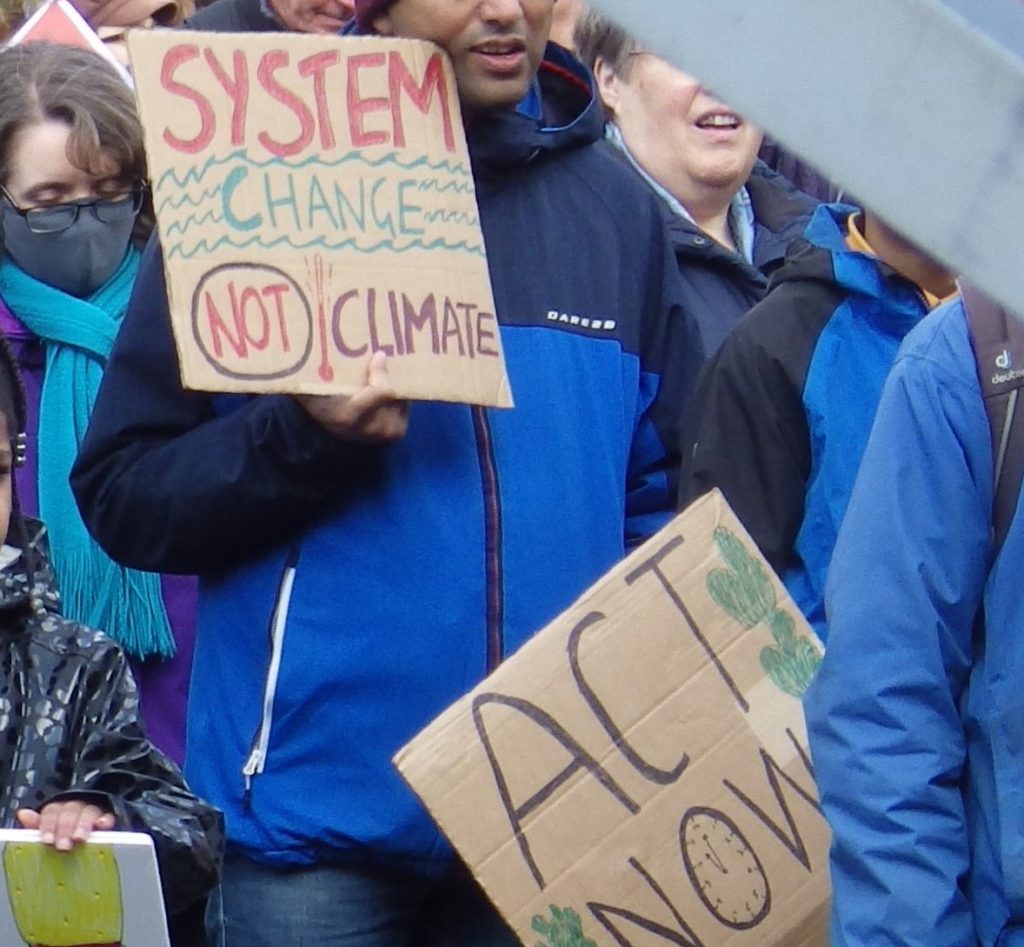By John Pickard
It is hard to find a fitting epithet for the COP FLOP that has ended in Glasgow this weekend, but it is probably the statement by the president of Palau, an archipelago of over 500 islands in the Western Pacific. Speaking about the “slow and painful death” that his nation will suffer from global warming, he told the assembled delegates, “You might as well bomb us.”
COP26 has been a huge flop. Made toxic by the sabotage of 550 lobbyists from the giant oil and coal companies, emasculated by governments in hock to the same fossil fuel extractors, the conference has given us nothing but more of the same. The latest calculations by scientists estimate that the commitments made will generate a 2.4oC rise in global temperatures by the end of the century and that is a disastrous scenario.
Surgangel Whipps Jnr, the Palau President, summed up the frustration, but none of the anger felt by the millions of demonstrators, including hundreds of thousands in the UK, who rallied in cities around the globe during COP fortnight. That anger was better expressed by Greta Thunberg, who described the conference as a “massive PR event”.
A greenwash festival
Boris Johnson, in his final speech to the conference talked about a ‘road map’ to zero carbon. It was his usual bluster, offering not so much a road map as a cartoon treasure map: lacking in any detail, but with a scrawled ‘X’ marking a theoretical spot. As for the much-heralded commitment from China and the USA, the world’s two biggest emitters of carbon, to boost climate cooperation, that is another meaningless PR stunt, much like Satan meeting Lucifer to agree a pact against sin.

Speaking at a rally in Glasgow at the mid-point of COP26, overwhelmingly attended by young people, Greta Thunberg was far more realistic than Johnson about outcomes, accusing the rich countries in the Global North of utterly failing to put in place the urgent actions needed. Their main goal, she said was “to maintain the status quo…this is now a Global North greenwash festival. The most affected people in the most affected areas still remain unheard...the leaders are doing nothing, they are actively creating loopholes and shaping frameworks to benefit themselves and to continue profiting from this destructive system.” (Financial Times)
Jeff Bezos has to fly into space to get an education
The greenwashing almost achieved the level of farce on some occasions. We had, for example, Amazon emperor, Jeff Bezos, defending his ego-trip into space by telling COP26 participants that it made him realise how “finite and fragile” the Earth is. I dare say you could have heard hundreds of jaws hitting the floor, not that a super-ego would even notice. Some other highlights from the two-week circus were:
The rhetoric on financing the climate has reached new levels of hyperbole. According to the Guardian, “Hundreds of the world’s biggest banks and pension funds with assets worth $130tn have committed to a key climate goal…by 2050 all assets managed by the institutions will be aligned with net zero emissions.” Meanwhile, Rishi Sunak has announced that London will become the world’s “first net-zero finance centre” (November 4).

Only the $130tn figure is real, because it shows the power of the big pension funds, banks and investment funds. But the “net-zero” commitment means nothing for these gigantic financial corporations who are so expert at dodging taxes and manoeuvring between the lines of any agreement. These big companies employ phalanxes of tax experts and lawyers to help them get around legal restraints and tax liabilities. With deliberately complex networks of interlinked companies, many based offshore, they will easily manage to look ‘green’ while acting dirty.
Promise to fund underdeveloped countries is an acid-test
The original commitment for the richer countries to finance poorer countries to the tune of $100bn a year is an “acid test” for whether rich countries are sincere, according to Molwyn Joseph, minister of the environment for Antigua and Barbuda. “We are not asking for handouts, we are asking for compensation for damages, as a result of the profligacy of these developed countries,” he says. “Those that emit this carbon, that is causing climate events, should pay.” (Financial Times, November 3). The disconnect between the financial ‘promises’ and what they mean in reality has been analysed in more detail by Marxist economist, Michael Roberts here.
As for the London finance markets, it is no accident that this city is the world’s leading centre for laundering or hiding dirty money. Nor is there the remotest possibility that the British government would clamp down on the many British Overseas Territories like Belize, the Virgin Islands, Bermuda and the Cayman Islands, which are notorious for also dodging taxes and laundering dirty money. So there is not a chance of imposing meaningful carbon-cutting measures on the finance houses of London.
Fossil fuel restrictions and ‘wiggle room’
According to the Financial Times (November 2), “The financing of highly polluting fossil fuel industries has been one of the most contentious topics [at COP26], leaving banks such as Barclays, Deutsche and BNY Mellon open to accusations of double standards. Across the global banking sector “too many fossil fuel restriction policies currently contain too much wiggle room, discretion or hazy definitions”, said analysts at Autonomous Research”.

Looking at some specific commitments, it has been reported that forty countries have signed up to end the production of power from coal. However, the signatories do not include the world’s biggest producers of coal, like Australia, the USA, India or China, producers of 5.4bn metric tonnes in 2018 between them, out of 7.8bn world-wide. So countries producing 70% of coal (2018 figures) are not signed up.
Unfortunately, the same story is emerging over curtailing methane emissions. The Financial Times (November 2), reports that “more than 100 countries have signed up to a global initiative to crackdown on methane pollution over the coming decade, but a handful of major emitters remain outside the deal sealed at the UN climate summit…including China, Russia and India”.
British government helping Saudis sabotage COP26?
As an aside – which might become a central issue at some point – climate activists have also reported that the Energy Charter Treaty, signed by fifty-three countries (including the UK) allows for energy corporations to sue governments for compensation, in the event that they implement policies that damage profits. Again, not something that fills young people with confidence in meaningful carbon reduction measures ever being implemented.
Another interesting aside is that the British government has actively worked with the Saudi government, one of the conference’s most significant saboteurs. The UK Government website for the Foreign and Commonwealth Development Office shows the links the UK government has with Saudi Arabia and other Gulf states.

Under Saudi Arabia, it lists one of the UK government projects was to bolster “the strategic partnership and delivers mutual prosperity and security by supporting Saudi Arabia’s Vision 2030 reforms across priority sectors in line with UK values…” and one of means to do this was “communications: COP 26 Campaign and Digital Funding”. Does that mean, therefore, that the UK government, even while it has been hosting COP26, has been actively conniving with Saudi Arabia to undermine it?
Nearly three quarters think climate change is human-made
Given the utter cynicism behind the posturing of big business and their tame politicians, it is hardly surprising that so many of the public do not trust them to deal with climate change. There is widespread concern about the issue – 72% of British adults polled think that climate change is due to human activity, twice the figure of ten years ago. The figure among youth will be a lot higher.
But according to another poll by YouGov, “only 13% thought those who call for action on the climate crisis are doing so out of a desire to see progress, while 68% thought they were doing it for a PR boost”. There is little difference, it appears between Tory and Labour politicians, which is something that should concern Labour Members. “Overall”, YouGov reports, “the public thinks that Tory politicians are more interested in maintaining a good image for themselves (56%) rather than generating action on climate change. Another 45% think the same of Labour politicians…”
Those young people leaving the Glasgow rally after listening to Greta Thunberg and reading press reports may be justifiably dispirited by the utterly cynical hypocrisy displayed by governments, political leaders and, not least, big fossil fuel corporations at COP26. But many of them have already drawn the conclusion that the only way to save the planet is to change the system. Let us hope that any disappointment with COP26 is temporary and that young people become more energised and motivated than ever to fight to save the planet by doing just that…changing the system and saving their future.



